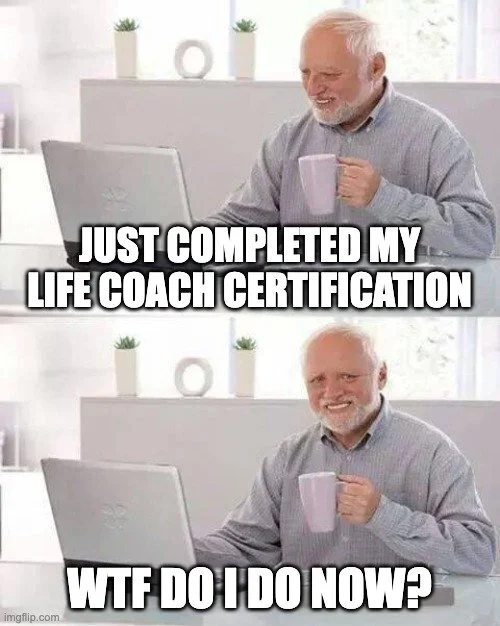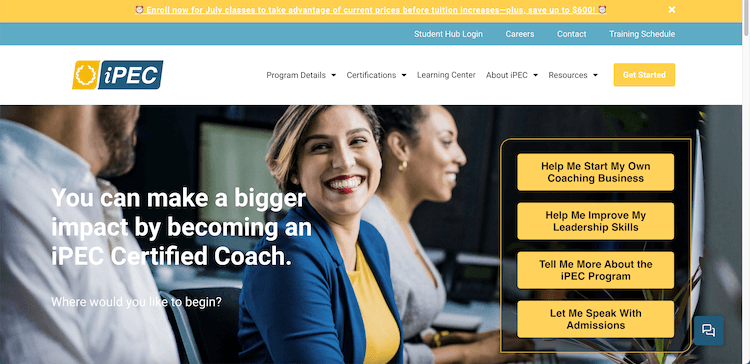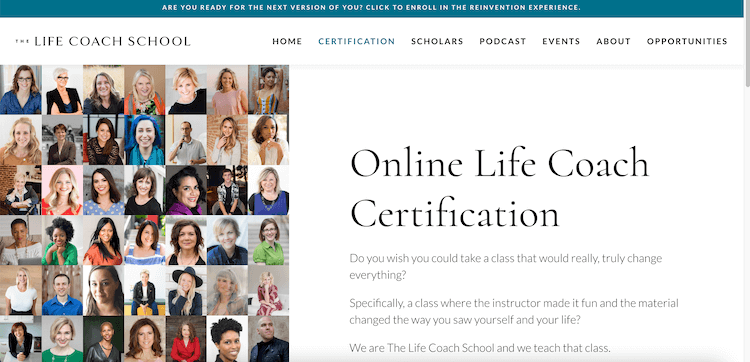Life Coach Certification: Is It Really Worth It? 18 Recommended Programs
Life coaching is an unregulated industry. You don't need any qualifications to work with paid clients. Personally, I make 6 figures per year as a coach and I never got certified.
So, why do other people do it?
I honestly have no idea.
Just kidding. Sort of.
The truth is, most new coaches don’t know where to start. All they know is that they want to help other people achieve their full potential.
They figure that a certification program will give them the skills to do this.
And, in fairness, there are some certification programs that do a great job at teaching you how to coach. But it takes more than coaching skills to build a business. More on that later.
In this guide to life coach certification programs, you’ll learn:
Table of contents:
Before you dive in, click the button below to download my free guide on how to coach:
What Is Life Coach Certification?
A life coaching certification is simply a piece of paper or online badge you get from a company that says, “This person did our training program.”
The real work of building a business happens after you get certified.
There are two types of life coaching certifications: ones that are ICF-accredited and ones that aren't.
ICF stands for International Coaching Federation. It's the main credentialing body for coaches and coach training programs.
Some training programs pay the ICF to take a look at their curriculum and make sure it meets ICF standards. You do the program, then log some peer coaching hours and get a more experienced coach to supervise you. Then, upon graduating one of these programs, you also pay the ICF to become a member.
As a result, ICF-accredited programs cost more on average than non-accredited programs.
Is it worth it to become ICF certified? That depends.
If you work in organizations as an executive coach, HR may screen for the credential. But honestly, you don't want to go through HR and compete against other coaches. It's much better to get hired directly by the founder or executive that you're working with.
The other potential upside of being ICF certified is getting exposed to other coaches in the ICF network, which can sometimes lead to new referral partners and friendships. This community aspect can make coaching as a career more enjoyable.
The bottom line is that I wouldn't focus so much on whether or not a program is ICF certified. Our #1 pick is. But, as I'll explain later in the article, certification isn’t inherently valuable.
What can be valuable is the training you receive at these life coaching schools. Since coaching isn't regulated, you're not really paying for a certification to be a life coach. You're paying to acquire coaching skills.
How to Choose The Right Coach Training For You
Which life coaching school is best? It all depends on your decision making criteria.
There are in-person trainings and online trainings.
There are three day trainings and 12 month trainings.
There are cheap trainings and expensive trainings.
There are niche trainings (e.g. health coaching) and general trainings.
So, for example…
If flexibility is important to you, you may want to do a coaching certification online. One that you can complete in your own time.
A good life coach training will teach you how to ask powerful questions, how to help your clients set and achieve goals, and how to help them generate their own insights.
We’ll dive deep into the top three programs in the next section, but here’s how they compare at a high level:
The 3 Best Life Coach Certification Programs
Below, you’ll find a list of the three best life coach training programs.
This list was created based on a survey of 34 coaches. Not the largest sample size, but definitely better than asking one coach you know which program they did.
Our respondents were asked to rate the program that they attended and provide additional feedback. In order to be included in our top 3, the program had to be nominated by more than one coach and have an average score above 8/10.
I’m not affiliated with any of these programs and I don’t care if you sign up for them.
Here are the top three life coach certification programs, according to our survey:
Let’s take a closer look at each:
🥇Institute for Professional Excellence in Coaching (iPEC)
Best For: ICF Accreditation
Average Rating: 9.4
The Bottom Line:
iPEC was the most popular certification program among our respondents. It offers an intense 10-12 month training, ICF accreditation, and a community of other coaches. While it’s a big investment, it’s not the most expensive training program we reviewed.
Pros:
✅ Strong community and connection with colleagues
✅ Structure that creates intensity and commitment
✅ ICF Accreditation
Cons:
❌ Lots of foundational principles to learn
❌ 10-12 month program
❌ Higher priced program
Price:
$11,950 USD
Length:
This certification can take 10 to 12 months to complete, and offers 320 training hours.
Format:
iPEC’s Coach Training Program is delivered via webinars, e-workbooks, and self-study materials, plus three days of live in-person or virtual classes.
ICF Accredited?
Yes
iPEC Reviews:
“I enjoyed the connection of energy/mindset to our overall success…the core energy coaching techniques they teach…I see the benefit in all of it. Still do, 8 years later.”
“I learned a lot of amazing tools and concepts. I also connected with an amazing community (that I am still connected with years later)…There was some basic business prep, after completing the program I had wished there was better business education.”
— Anonymous
“[I liked the] Structure. I didn’t agree with all of the foundation principles and felt that [there] were too many.”
— Jill Levine
The Bottom Line:
The Life Coach School is an online, self-paced program. It’s almost double the price of our #1 pick. It’s not ICF accredited. And it did get some criticism. However, our respondents appreciated the self-confidence they gained as a result of the program.
Pros:
✅ Mindset and confidence building
✅ Live networking events are held throughout the year
✅ Guides and curriculums for entrepreneurship
Cons:
❌ Teachings not always evidence-based
❌ Not enough feedback from instructors
❌ Higher priced program
Price:
$21,000 USD
Length:
Self-paced curriculum. 5 hours per week recommended.
Format:
Includes monthly calls, membership and an in-person mastermind workshops. The training is delivered 100% online.
ICF Accredited?
No
Life Coach School Reviews:
“…I grew in my own self-awareness and self-confidence….I wish there was a little more opportunity to get feedback 1:1 from instructors or mentors. Especially in the second 6 months.”
— Anonymous
“The teaching format of their coaching tool, being coached and observing coaching as well as classes helped me master the tool…[it was] very expensive with no critique of the concepts presented as the truth even though some of them are incorrect scientifically.”
— Anonymous
“[I liked] Learning about the power of mindset…It was not thorough - didn’t address basic coaching concepts, like contracting with the client, and it wasn’t trauma informed.”
— Anonymous
The Bottom Line:
Transformation Academy offers in-depth coach trainings on a budget. I love that many of their trainings are niche-specific. For example, they have a business coaching certification. Keep in mind that these aren’t interactive programs - it’s basically going to be you, some videos, and some worksheets. That’s why it’s our least expensive pick.
Pros:
✅ Content is thorough and in-depth
✅ Offers CPD/CEU credits
✅ Low cost program
✅ Niche-specific trainings
✅ Responsive faculty
Cons:
❌ Not ICF accredited
❌ No in-person events or community aspect
❌ No coaching practice or feedback
Price:
$497 USD (price varies based on course)
Length:
The programs are self paced and can vary from 10 to 25+ hours each, including video lectures and independent activities.
Format:
All of their training programs are 100% virtual and self-paced. Consists of video-based training with printable worksheets.
ICF Accredited?
No
Transformation Academy Reviews:
“The information is very thorough. They make sure you do all the steps and are very responsive.”
— Mel
“I[t] taught the psych part of coaching and mindset that I wanted to understand and it was a very low cost program…I never used the worksheets.”
— Anonymous
15 More Programs That Coaches Recommend
Here is a list of 15 “honorable mentions” — coaching schools that also received at least an 8/10 by their nominees, but were only nominated by one coach.
In alphabetical order:
Accomplishment Coaching
“It was the first time I felt like there was hope for my personal transformation. The first class I sat back in my chair and let out at sigh. I never looked back.”
ADAPT Health Coach Training Program
“I'm most grateful for the community aspect and the true, lasting friendships that have formed. I also loved that the program was so in-depth, intense at times, comprehensive, challenging, rewarding. It was based on scientific evidence (not only the content itself, but also the way it is structured in order to learn best). I also really appreciate how much real coaching practice and feedback we got!”
Certified Coaches Alliance
“[This was] an introduction to what coaching really is. People become coaches, but they have no structure on how to go about with the clients. Here we learned the skills of being a coach.”
“For a person like me, who is not from HR background, it was a great foundation. I had a feeling that I wasn't starting from zero.”
Circle Anywhere
“The most transformational course I've ever been a part of. I am much more able to facilitate client transformation through embodying a balance of directionality and acceptance. Wisdom on steroids.”
— James Dial=
Coaching With Spirit - The Graduate Institute
“Coaching with Spirit really taught me how to attune to my clients by first and foremost being grounded and present with myself. I became a much more engaged and embodied coach through this program. I listen more deeply (beyond the words), ask better questions, and really track my clients holistically. It was my 3rd coach training and by far my favorite.”
Co-Active Training Institute (CTI)
“[They taught] powerful coaching skills.”
— Jeremy
College of Executive Coaching
“Don’t be mislead by the title – training for becoming an executive coach involves a great deal of life coaching! And that’s what the faculty in CEC’s programs provide a great deal of support in. If you do decide to do the ICF credential, their classes prepare you well for the exam.”
GIANT Worldwide
“Focused on Leadership coaching. The program focused on practical and relevant leadership tools and using them on yourself first. There was a constant reminder that you are your first testimonial. As you get to know yourself, you can lead yourself. Then you can guide others.”
Health Coach Institute
“[Health Coach Institute] got me started, [but] they made it sound WAY too easy to start a business.”
— Anonymous
Integral Coaching Canada
“The use of metaphor to help a client recognize their Current Way of Being, and seeing a New Way of Being in which to move forward [was the most valuable aspect of the program]."
Jay Shetty Certification School
“There wasn't anything I didn't like. [I liked] the lessons, course materials, mentoring, coaching practice, [and] feedback from supervisors.”
— Meagan Iskra
Life Purpose Institute
“I loved the curriculum, the teachers, and the way they conducted getting hands-on experience. I had never done any type of coaching before and would not have felt confident conducting any level of coaching without the program. I felt significantly more confident by the end of the program compared to when I started.”
— Anonymous
Lumia (Formerly JRNI)
“I loved the curriculum, the teachers, and the way they conducted getting hands-on experience. I had never done any type of coaching before and would not have felt confident conducting any level of coaching without the program. I felt significantly more confident by the end of the program compared to when I started.”
— Anonymous
New Ventures West
“As a new coach, I was frustrated by not having enough "tools" for what happens in the middle of coaching. However, the more I coach, the more I see that "building the body of a coach" (i.e., being a present and awake human that can meet life with immense capacity) is the only tool you need. This capacity as a coach demands devotion to self-practice, which is the program's primary focus. I have deep respect for the faculty of NVW and how they model how to be in the world with their presence and attention to life.”
Royal Roads University
“[It was] backed by peer-reviewed research.”
— Anonymous
Why You Might Not Want To Get Certified
Many new coaches assume you need to complete a coaching certification program in order to build a successful coaching business.
You don't.
But before I go any further, let me clarify something…
Not all coach certification programs are a waste of time and money. I used to think they were. But as we’ve seen in this article, there are some great programs out there. And doing a coach training is one of the best ways to build connections with other coaches.
Thing is, you don't need to spend $20k and one year of your life in order to learn the fundamentals of coaching. If your goal is to build a coaching business, you might be better off spending your resources elsewhere.
Here are 6 reasons why:
1. Many skilled and successful coaches aren't certified. Often, these coaches apprenticed under someone or created their own signature system based on diverse trainings and experiences. Likewise, there are a lot of bad coaches out there who are certified. The correlation between certification and success is a weak one.
2. It may not give you the confidence that you think it will. Most coaches get certified with the hope that it will make them feel less like a fraud. Maybe. Or maybe you’ll still have the same feeling of unworthiness after the program ends, just with a certification. Confidence comes from working with clients.
3. No one cares about your coaching certification. Turns out, your potential clients don't care whether you got certified or not. They care about the results you can help them get. Don't have results yet? That's because you spent the last 12 months in coaching school.
4. There's a difference between training and certification. I invest thousands of dollars in training each year. But instead of looking for a one-size-fits-all solution, I seek out the best program for whatever competency I want to develop. Then, I can apply it immediately to my client work and my business.
5. Getting certified doesn’t guarantee a profitable coaching business. Coaching is not the hard part for most people. The hard part is marketing and sales. Even though some certification programs attempt to teach business, it's really not their zone of genius. Most will just tell you to pick a niche and start networking. Cool, bro.
6. There are many different sources of credibility. And in coaching, certifications are one of the weakest. Credibility can come from your personal story, your client results, even other experts who you’re associated with. Real credibility comes when your potential clients feel that you understand their problem and that you have the solution.
How To Become A Life Coach Without A Certification
If you decide not to do a certification program, what should you do instead? And if you've already gotten certified, what should you do next?
STEP 1: Get a coach
Your next step is to invest in working with a coach who has built the type of business that you want to build.
It's true that some certification programs include a mentor coach as part of the deal. And that person might be a great coach. But here's the rub: If that mentor was really able to build a successful business, they wouldn't be working for the certification company. Instead of being matched with someone who may or may not be successful, invest in the best.
If all you did was this one step, you would probably be okay. If you don't invest in your own coach, though, a few things will happen:
You won't have invested in and benefited from powerful coaching, so you’ll have trouble selling it to others.
You won't know firsthand what good coaching looks like, so you'll be missing out on all of the learning that comes from experiencing it yourself.
You won't have developed yourself, as a coach or as a business owner, to the point where you can actually transform your clients in any significant way.
If you can't invest a lot of money in coaching right now, make sure that you're at least investing in courses and trainings. This is a more affordable way to get support while still staying in integrity as a coach.
STEP 2: Get clients
At this point you might be asking yourself, "How do I get clients if I don’t do a coaching certification?”
According to our survey respondents, life coach schools do a terrible job at teaching you how to get clients.
One of the best ways is to offer a limited number of free sessions to your warm network. Then, get on the phone with each one and follow my 3C Sales System.
Feel free to get training, read books about life coaching, and work with your own coach on how to structure those sessions. Just remember that at some point, you're going to have to start working with paid clients.
That's when you really get good. Why? Both of you are committed! So you can finally begin to figure out what works.
Read: Coaching Packages And Pricing: What's The Best Model For High End Clients?
STEP 3: Get results
Your clients don’t care what certifications you’ve done. They care about the results that your clients get. And that's what you should care about too.
How do you help people get results?
Through deliberate practice. That means listening to recordings of your coaching, applying new techniques, and asking your clients what the most helpful part of each session was.
This is how people achieve mastery in the real world. Training is great, but you can't become a coach in the classroom. You have to actually put this stuff into practice.
To help you out, I've written up my 20 Commandments of Powerful Coaching. It will give you the basics. Download the PDF by clicking on the button below:
My Final Verdict On Life Coach Certification Programs
Many certification programs sell the dream of a fulfilling career. But let’s be clear: what you actually receive is training on how to coach people.
If you decide to sign up for a certification program, do it to become a better coach.
Don’t do it to get a fancy piece of paper (which clients don't care about). And don’t do it with the expectation that you’ll learn marketing.
My advice?
Get training, but don’t feel like you need a certification. If you want to be a coach, start working with clients now.
More advice in this video:
Click the button below for my top tips on how to coach:


















